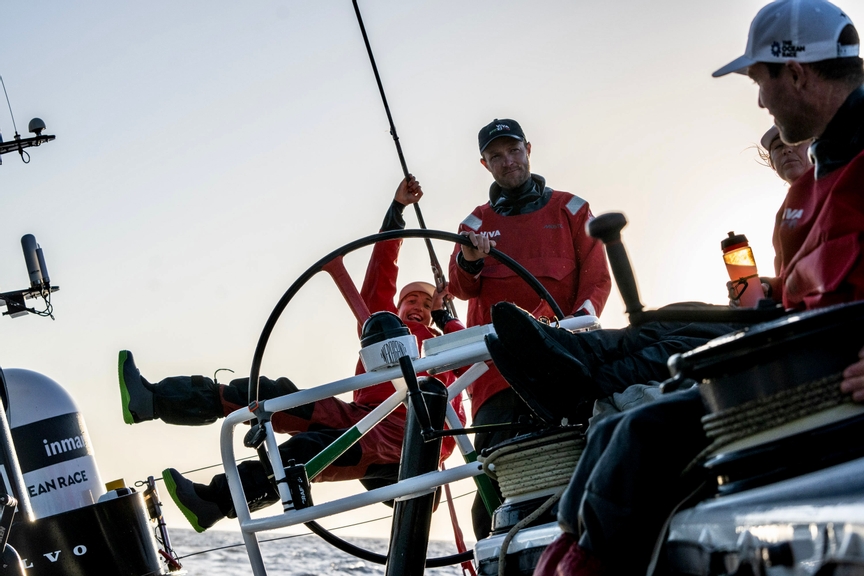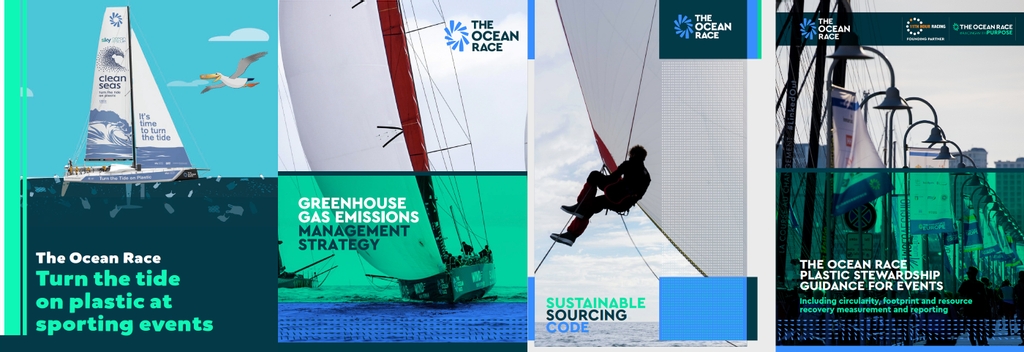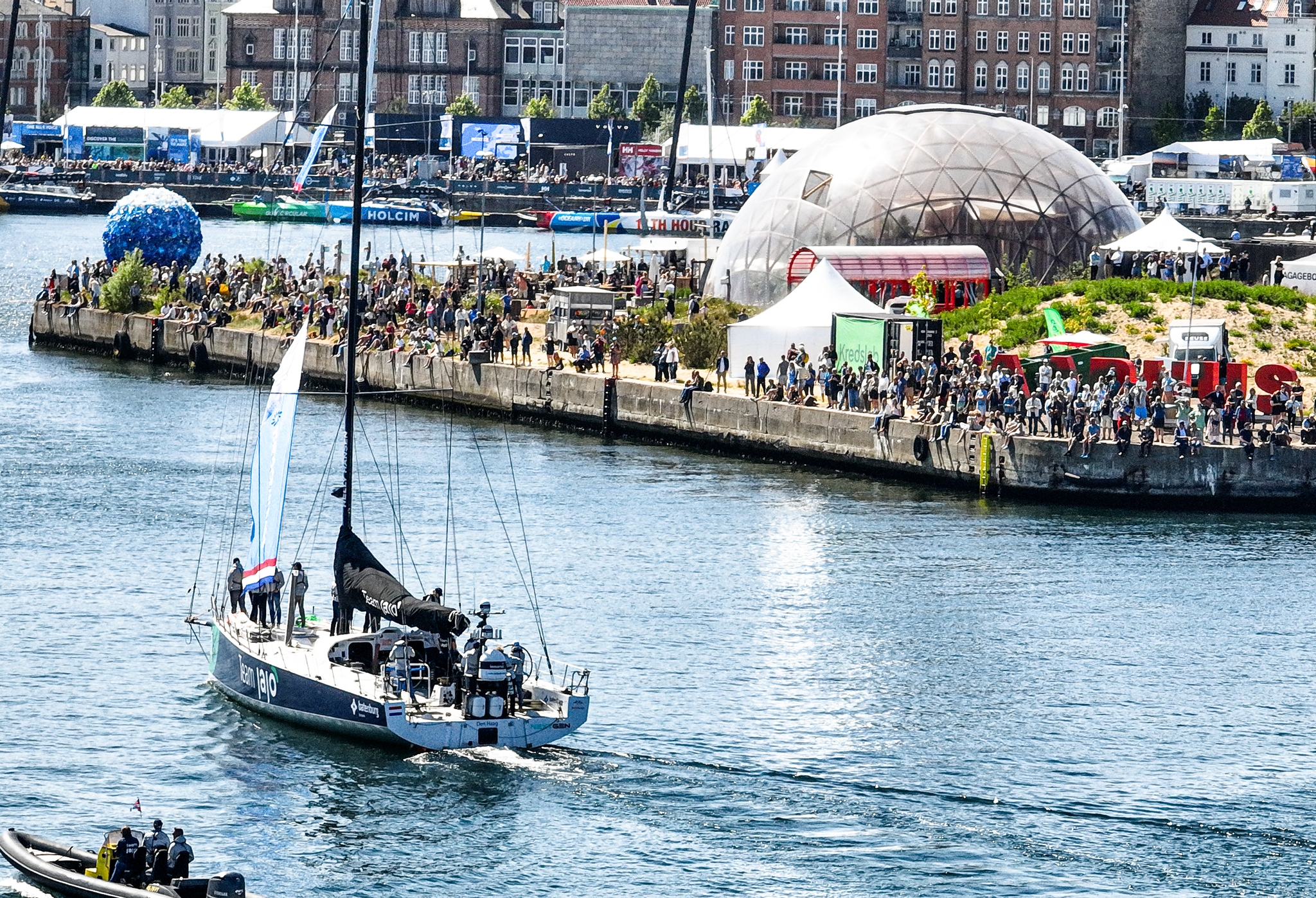Introduction
Hosting races across the world, with stopovers in iconic cities, hundreds of staff supporting the event and millions of visitors to our race village, Ocean Live Park, comes with its own footprint.
We have a duty to operate sustainably and we strive to be a leader in sports, events and sustainability - testing new ways to produce our Race with the maximum positive impact possible.
Below is an overview of our approach. For more detailed information, including plans, policies, reports and industry guides check out the Knowledge Centre below the text.
Our Ambitions

We organise our sustainability framework under three main pillars: Impact, Footprint and Legacy. Under the 'Footprint' pillar of our sustainability framework, we set ambitious targets for the operational impacts of our Races, while 'Impact' and 'Legacy' are focused on engaging people in sustainability, ocean issues and action. Within this sits our Science programme, Summits, Learning programmes, Blue Relay and our efforts to inspire fans and the wider public through ocean health campaigns.
Our sustainability programme aligns with many of the United Nations (UN) Sustainable Development Goals, with our focus on ocean health, climate change and plastic pollution aligning directly with SDG’s 12 Responsible Consumption and Production, SDG 13 Climate Action, and SDG 14 Life Below Water.
One of the overarching aims of our work is to use the race as a platform for positive change, which supports the UN Ocean Decade Vision 2030 Challenge 10: Restoring Society’s relationship with the ocean.
Key Sustainable Operations Targets
Our Races adhere to all relevant environmental regulations and protections and take a restorative approach to try to ensure that the race and all event activities do not negatively affect the surrounding natural environment and biodiversity.
For each of our events we produce a dedicated Sustainability Action Plan (available to download in the Knowledge Centre at the bottom of the screen) which includes measurable targets. Read on to find out more about the work we are doing in some of the key areas.
Water & Environmental Protection

We work hard to ensure the physical setting in which our activities take place are protected from negative impacts. This includes boat maintenance, construction and installation of Ocean Live Park assets, and our on-water and on-shore activities. Surrounding waterways are protected from pollutants or impacts from boatyard, event site development and Race activities.
Our onboard, at-sea and race village operations are planned to ensure we meet or exceed any environmental regulations, protocols or best practice. Sailing boats adhere to 'Rule 55 Trash', and we ensure all boatyard operations, any chemical use and cleaning practices are safe.
Every effort is made to responsibly use the most precious of earth’s resources - water. We do not overdraw potable water supplies and optimise the use of recycled water for non-drinking purposes, where it's available. We also provide free drinking water in all of our Ocean Live Parks.
Sourcing

The purchases made, materials used and food served throughout The Ocean Race are important examples of our commitment to sustainability. Requirements around sustainable purchasing are included in our agreements with host stopovers, race teams and partners, along with our own suppliers and contractors.
Our sustainable purchasing decisions are guided by our Sustainable Sourcing Code (available in the Knowledge Centre). Key areas of sourcing and materials include:
- SUSTAINABLE LOOK & OVERLAY
The events and sports sector globally uses an immeasurable volume of single-use, mostly plastic, materials to dress our live event sites. We aim for 100% of our branding to be PVC-free and made from recyclable or recycled materials. It is also a requirement of our host cities that they have an end of life plan that does not include landfill for all on-site branding.
In an effort to tackle the issue the Race has led an industry working group on Sustainable Look and Overlay. Read more on this project in the legacy page and in the Knowledge Centre section at the bottom of this page.
- FOOD
Food service is the perfect platform to promote sustainable food systems locally. From paddock to plate, we can highlight local sustainable farming, seasonal produce, and the benefits of chemical-free food.
We recommend at least two thirds of catering to be vegetarian and all seafood to be from sustainable sources.
Read our Sustainable Catering Guide in the Knowledge Centre section at the bottom of this page.
- SUSTAINABLE BOAT BUILDING
The design and manufacture of race boats is managed by the teams, however, The Ocean Race has championed efforts to make the industry more sustainable. Previously we hosted a series of Sustainable Boat Building Innovation Workshops, to bring together leading industry companies and race teams to identify opportunities for innovation and to address the key systemic challenges facing the transition to a sustainable future. Find out more here.
Climate

We delivered on our big ambition to make The Ocean Race 2022-23 climate positive, and successfully reduced greenhouse gas emissions (GHGs) by 75% compared with the previous race. We achieved this through reducing our own organiser impacts and by working with our race teams, partners, suppliers and host cities, to reduce the GHGs related to their participation in the Race.
As a signatory of UNFCCC’s Sports for Climate Action, we updated our commitment to become part of the Race to Zero in 2022, with objectives of 45% absolute reduction by 2030 and Net Zero by 2040.
Below are some of the key areas where we are working to reduce our impact.
- ENERGY
Our ambition is to have all Ocean Live Parks powered by 100% renewable energy. This is achieved through grid supply, renewable and zero emissions temporary power provision, and through purchasing renewable energy credits directly where 100% is not available directly from the grid. Equivalent kwh of renewable energy credits are also purchased against any diesel generators (minimally used). Our head office in Alicante is powered by 100% renewable energy, provided through the local co-operative Enercoop.
- LOGISTICS
To reduce international freight we prioritise sourcing local infrastructure and equipment. Our global logistics partner GAC is critical in helping us with the most efficient logistics possible and reporting on freight GHG impacts.
- TRAVEL
Producing races across the globe involves a talented group of professional sailing, racing and events people. We’re reducing our air travel impact through minimising the number of people travelling and travelling overland wherever possible.
Read more about our approach in our Greenhouse Gas Emissions Management Strategy in the Knowledge Centre at the bottom of the screen. Click here for a deeper dive into our approach to greenhouse gas emissions and our 'Race to Restore'.
Circularity

We circumnavigate the planet, so circularity is in our DNA! Recovering and cycling residual resources is an important element of our sustainability efforts.
No single use plastics or serviceware are allowed in Ocean Live Parks. We work with host cities to find alternatives, such as implementing returnable cup schemes, and as a result we have avoided hundreds of thousands of single-use plastic items.
We also innovate and look to create solutions where there are no existing options for circularity. In The Ocean Race 2022-23 we flew the first fully circular flag in sport. In a unique collaboration with Helly Hansen and supply chain stakeholders, we recycled event flags into new flags for the first time, proving that textiles circularity in sports is possible. Read more and watch a video explaining the process.
The Ocean Race has created resources for the event and sports industry, which can be downloaded in our Knowledge Centre. You can also view the Plastic Footprint for the 2022-23 edition of the Race.
Sustainability Framework
We align with relevant GRI Standards to report our management approach and measured outcomes and results. The GRI Standards are the first global standards for sustainability reporting. Read how we've indexed our reporting to the GRI Standards in our Sustainability Reports, available to download from the Knowledge Centre.
Sustainability management of The Ocean Race is facilitated through the implementation of our management system, in conformity with the requirements of ISO 20121. This systematic approach keeps everyone on task, updated and actively contributing to the sustainability strategy implementation.
ISO 20121: Event Sustainability Management System is an international standard, to enable best practice in sustainability planning and delivery of events. We have undergone a third party audit for conformity with the standard by Bureau Veritas Italy.
Knowledge Centre

We produce many sustainability management documents, guidelines, reports and resources. We're very happy to share these. Please sign up to download these industry resources.
Sustainable Event Management
Included are our Sourcing Code, Sustainability Policy, Greenhouse Gas Emissions Strategy, Turn the Tide on Plastics at Sporting Events, Plastic Stewardship and Footprinting Methodology for Events.
-
You don't have access to this material. To download, please sign up here
- {{item.filename}}
- {{item.filename}}
Reports
Included in this section are our Sustainability Reports for previous editions of the Race and our annual reports. Also in this section are report from The Ocean Race Summits.
-
You don't have access to this material. To download, please sign up here
- {{item.filename}}
- {{item.filename}}
Innovation Workshop Reports
We have previously hosted Innovation Workshops, which provided a forum for tackling sustainability challenges that affect sailing, sport, events and ocean governance. Created as a way of sharing best practice and advancing solutions, the sessions brought together an expert group around a specific topic.
Innovation workshop topics have included Communicating Ocean Science With Impact, Sustainable Look & Overlay and Sustainable Boat Building.
Take a deep dive into The Ocean Race Innovation Workshops through reports from the previous events, plus re-play some of the workshops:
-
You don't have access to this material. To download, please sign up here
- {{item.filename}}
- {{item.filename}}
